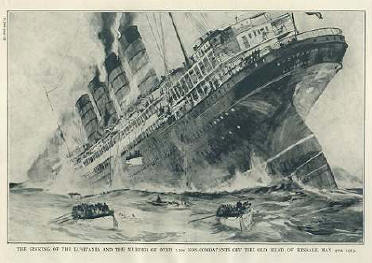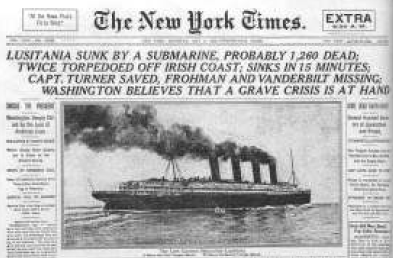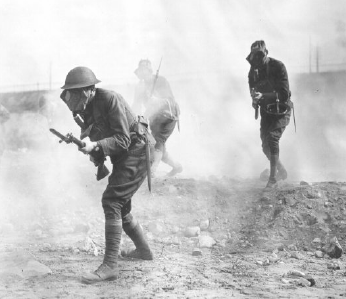The Lusitania and
World War I
“The same crowd which manipulated the passage of the income tax and the
Federal Reserve System wanted America in the war. J. P. Morgan, John D.
Rockefeller, "Colonel" House, Jacob Schiff, Paul Warburg and the rest of the
Jekyll Island conspirators were all deeply involved in getting us involved.
Many of these financiers had loaned England large sums of money. In fact, J.
P. Morgan & Co. served as British financial agents in this country during
World War I.”
Gary Allen, None Dare Call it Conspiracy
World War I officially began on June 28th, 1914 when members of
the
Illuminati Black Hand secret society assassinated Archduke Franz Ferdinand.
Europe quickly polarized and warred for nearly a year before Americans were
given their false flag reason to join. On May 1st, 1915 the British Naval
cruiser “Lusitania” was scheduled for Liverpool, taking off from New York
harbor loaded with 600 tons of explosives, 6 million pounds of ammunition,
1,248 cases of shrapnel shells, other war materials, and last but not least
– American passengers.
The German embassy in D.C. was fully aware of the war
materials being shipped into England on the Lusitania and tried to warn
American travelers.
German embassy officials attempted to place
full-page ads
in 50 U.S. newspapers reading:
“Notice! Travelers intending to embark on the
Atlantic voyage are reminded that a state of war exists between Germany and
her allies and Great Britain and her allies … travelers sailing in the war
zone on ships of Great Britain … do so at their own risk.”
Due to actions
taken by the U.S. State Department, 49 of those 50 newspapers never ran the
ad.
“The German government took out large ads in all the New York papers warning
potential passengers that the ship was carrying munitions and telling them
not to cross the Atlantic on it … Yet the sinking of the Lusitania was used
by clever propagandists to portray the Germans as inhuman slaughterers of
innocents. Submarine warfare was manufactured into a cause célèbre to push
us into war."
Gary Allen, “None Dare Call it Conspiracy”
Midday May 7th, off the coast of Ireland, the Lusitania was ordered to
reduce speed, and “Juno,” its British military escort vessel, was ordered to
withdraw.

Committee of 300, 33rd degree Freemason, and Lord of the Admiralty
Winston Churchill knew German U-Boats were in the vicinity and purposely
called off Juno, leaving the Lusitania a sitting duck.
“British commander Joseph Kenworthy, on duty when the ship was sunk, later
revealed that her military escort was withdrawn at the last minute and her
captain ordered to enter at reduced speed an area where a German U-boat was
known to be operating. It is clear why Germany attacked this ship, and
Britain would have done the same if U.S. munitions were being shipped to
Germany. ‘The Germans, whose torpedo struck the liner, were the unwitting
accomplices or victims of a plot probably concocted by Winston Churchill,’
concluded author Simpson.”
Jim Marrs, “Rule
by Secrecy” (189)
“The Lusitania was a ploy. It was packed with some Morgan owned ammunition,
had been given over to England as a member of the navy, and despite the
warnings of the Germans was sent Into a naval war zone, specifically to be a
target the catalyst for America’s entrance to the war …Churchill ordered the
Lusitania’s naval escort to
return to port, and the fated ship was left unprotected, to be sunk.
Rothschild agent Colonel House probably knew of this plot, records point to
a discussion of it between him and Sir Edward Grey of England. Historian
Colin Simpson called the sinking of the Lusitania the ‘foulest act of
willful murder ever committed on the seas.’”
Fritz Springmeier, “Bloodlines
of the Illuminati”

Churchill’s fellow Committee of 300 member, CFR founder, and Rothschild
agent Colonel Mandel House was also President Wilson’s top political
advisor. Wilson said,
“Mr. House is my second personality. He is my independent self. His thoughts
and mine are one. If I were in his place, I would just do as he suggested.”
This is a man who has also been called the Henry Kissinger of his day. In
the book “The Intimate Papers of Colonel House” is a conversation recorded
between Colonel House and the Foreign Secretary of England, Sir Edward Grey.
Grey asked,
“What will America do if the Germans sink an ocean liner with
American passengers on board?” and House answered, “I believe that a flame
of indignation would sweep the United States and that by itself would be
sufficient to carry us into the war.”
Just as “luck” would have it, that is
exactly what happened. Around 1,200 were killed, including 128 Americans.
“This act set off a firestorm of anti-German feeling throughout the United
States, fanned by the Rockefeller-Morgan dominated press.”
–Jim Marrs, “Rule
by Secrecy” (188)
So Illuminati Morgan owned ammunition was loaded on a ship with American
passengers. Committee of 300 and 33rd degree Mason, Winston Churchill,
ordered off the ship’s military escort knowing German U-Boats were standing
by. Then the Rockefeller-Morgan dominated U.S. press helped stir anti-German
sentiment until the people were sufficiently propagated to enter the war.
President Woodrow Wilson, like Winston Churchill, the Morgans and
Rockefellers, knew of the Lusitania’s preplanned fate, and he knew the
decision to sink it was out of his hands.
"There can be no doubt that President Wilson was told of the character of
the cargo destined for the Lusitania. He did nothing, but was to concede on
the day he was told of her sinking that his foreknowledge had given him many
sleepless hours."
Colin Simpson, “The Lusitania”

"Woodrow Wilson was reelected by a hair. He had
based his campaign on the
slogan: 'He Kept Us Out of War!'. . . Just five months later we were in it.
The same crowd which manipulated the passage of the income tax and the
Federal Reserve System wanted America in the war. J. P. Morgan, John D.
Rockefeller, 'Colonel' House, Jacob Schiff, Paul Warburg and the rest of the
Jekyll Island conspirators were all deeply involved."
Gary
Allen, “None Dare Call it Conspiracy”
“World War I was a financial bonanza
for the international bankers. But it was a catastrophe of such magnitude
for the United States that few even today grasp its importance. The war
reversed our traditional foreign policy of noninvolvement and we have been
enmeshed almost constantly ever since in perpetual wars for perpetual peace.
Winston Churchill once observed that all nations would have been better off
had the U.S. minded its own business. Had we done so, he said, ‘peace would
have been made with Germany; and there would have been no collapse in Russia
leading to Communism; no breakdown of government in Italy followed by
Fascism; and Nazism never would have gained ascendancy in Germany.’”
(Social Justice Magazine, July 3, 1939,
p. 4.) –Gary Allen, “None Dare Call it Conspiracy”
Back to Contents


